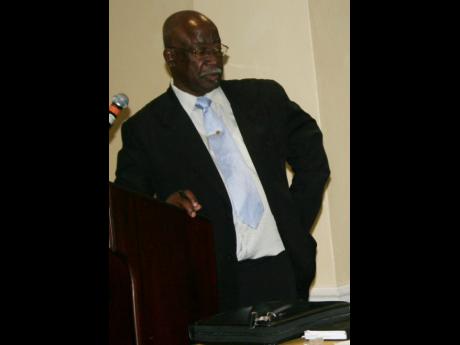A lifeline for fisher folks
President of the Whitehouse Fishermen's Co-operative in Westmoreland, Captain Havelon Honeyghan, has welcomed news of a planned multimillion-dollar investment in cage fishing to be done by B&D Trawling Limited.
"It is a lifeline for the industry," the veteran fisherman told The Sunday Gleaner.
"What they are trying to establish is a landing site in Whitehouse for cage fishing and they will be doing packaging. They will be doing other products otherwise from lobsters - fish and sea urchins, sea cucumbers and other things like those. It is a big thing, and they are going to be using Whitehouse as a pilot project for that kind of landing site," added Honeyghan.
The pilot project, which is the brainchild of Roderick 'Ricky' Francis, chief executive officer of B&D Trawling, represents an investment of millions of dollars in equipment and training of the fisherfolk in the seaside community which has recorded a serious decline in fishing returns.
"The fishing industry is contracting rapidly, and the production level is getting weaker and weaker every day. Ten years ago, we had 120 boats from Whitehouse going to sea. Today, we have about 21, and I mean this is not only affecting Whitehouse [but] all the beaches, including in St Elizabeth, Treasure Beach and Calabash Way - all of the beaches are seeing the same effect," said Honeyghan, who has been fishing for more than 50 years.
For this reason, B&D Trawling will need to invest in a major renovation of the beach facilities, as well as the cage aquaculture accessories, boats and training in a major undertaking in collaboration with the Whitehouse fishermen, a project Francis is looking to get started before year end.
Port Royal, Tower Isle in St Mary, and a location in Portland are next in line.
PHASE ONE
"We want to roll out the first cage aquaculture pilot project in July. It will be a community-based programme where we put the infrastructure in place and the Co-op will then manage it, in terms of growing the fish, with us providing the expertise and then we will purchase it (mature fish) from them when it is finished," said Francis.
"It's something we want to replicate all around the island, but there is an area in Whitehouse which we think is perfect for that. We have been scouting locations. This small first one, we will be putting in a one-acre size cage to just test it out, and through that, I think we can, in the first year, yield maybe 10,000 pounds."
Declining to say exactly how much the initial investment would cost, Francis said the company has done the necessary research to inform its mega investment, looking at fish species which are readily acceptable in the Jamaican market.
"It will be a network of cages with the fish separated by size. So once they grow to a certain size, we open a gate and let them into another section and then restock the first cage to start growing again.
"That way, we can stagger the production to have fish always available, once we get started," Francis explained, as he added that the monitoring would be of vital importance, especially during the start-up phase.
NOT REINVENTING WHEEL
"We'll have indicators, in terms of how the fish stock is growing, mortality rate and that kind of stuff. I guarantee you that we will have some teething pains. That's what a pilot project is about. I believe within six months, we can perfect it, work out any kinks. We are not really reinventing the wheel, we are spinning the wheel, because it has been done in many countries."
The operation will require licensing permission from the National Environment and Planning Agency, as well as the blessing of the Ministry of Agriculture and Fisheries, with Francis advising that those issues are being addressed.
He is confident that the fisherfolk in Whitehouse will work hard to ensure the project's success.
"Jamaicans want opportunities, they want jobs and we see this as a major initiative to create jobs, as well as income for fishers. They are going out and catching less, and the yield they are getting from going out to sea is not economical anymore. So we want to develop in this way so that we can cut down on imports and allow the wild fish stocks to regenerate," disclosed Francis.
Honeyghan, who is also president of the umbrella organ-isation, the Jamaica Fishermen's Co-op Union, which represents fisherfolk across the island, is impressed with the positive long-term implications for the marine environment.
"I think what Ricky Francis dem doing is something that will work because we are taking out, but we are not putting in, and we are not making any plans for helping to provide shelters for breeding (of lobsters), and every time that we have a hurricane, the sea floor is destroyed."
A family-owned business whose principal activities are the fishing, purchasing and processing of seafood for export, B&D Trawling has a vested interest in ensuring that Jamaica's marine resources are preserved and protected.
This is part of the reason the company is embarking on this first step, with Francis hoping he will be able to convince the authorities of the need to invest in a long-term import substitution plan, pointing out that Jamaica exports US$15 million worth of seafood each year, while importing US$109 million.

